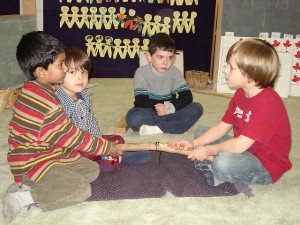
What do you think of single-sex education?
According to a Forbes.com article, single-sex education is on the rise in the United States. In 2020, about a dozen US public schools offered single-sex classes. In 2010, more than 500 public schools offer single-sex instruction.
Some see this the trend toward single-sex education as a positive; others consider it an old-fashioned technique that reinforces gender stereotypes. Perhaps not surprisingly, the American Civil Liberties Union (ACLU) is the prime antagonist of the single-sex education movement. An ACLU spokeswoman, quoted in the Forbes article, said, “The programs push the notion of a fundamental difference in the way boys and girls learn.”
And there it is, the 5-ton elephant in the corner. The are-there-differences-between-boys-and-girls question.
While some staunch feminists want to deny any innate differences between males and females, I believe the answer is yes. I’m all for civil liberties and women’s rights, but I simply don’t understand how anyone can argue that there are no differences (save the physical ones) between males and females. Anyone who has ever had a friend or partner of the opposite sex knows that men and women perceive the world differently. Anyone who has ever had a son understands, instinctually, that boys are different than girls.
“Different” isn’t better — and it certainly isn’t worse. It’s just different. And respecting and honoring those differences, rather than snuffing them, demonstrates respect for the child, whether male or female.
Serious scientific studies have documented serious biological differences in the brain function of boys and girls. While boys and girls are both equally capable of learning to read, the portion of the brain that handles language matures, on average, six years later in boys than in girls. Is it fair to ask all six-year-old boys to read at the same level as six-year-old girls? Boys’ fine motor skills develop more slowly than girls’. Is it fair to ask five-year-old boys to write with the same precision as five-year-old girls?
I don’t think so. It’s far better, I think, to support and encourage each child individually, respecting his or her natural gifts, inclinations and personal development. Single-sex classrooms are an institutional attempt to tailor education. School districts will never have the necessary funding for individualized education, so until then, single-sex classrooms a way of reaching boys and girls who often flounder in mixed-gender classes.
That’s my opinion anyway. What’s yours?







8 Responses
In principle, I agree. I used to teach at an all-girls school, and I liked it a lot–being able to ask questions and create curricula specifically designed around girls and their strengths and weaknesses.
Most of the kids in the top reading group in my son’s 1st grade class are girls–most of the kids in the bottom reading group are boys. It’s too bad.
On the other hand, I personally have a son who finds interactions with girls less stressful than those he has with boys–he hangs out with boys at lunch, recess, and after school, but he seems more at ease when he’s working with girls in the classroom (happens a fair amount b/c he’s in the top reading group). Or maybe that’s just my biased perception–he’s quieter and less “fight-y” b/c he’s with girls, and in class, so he *seems* more relaxed.
On a totally different subject, see here for a great boy-mom accessory: http://www.williams-sonoma.com/shop/bakeware/bakeware-new/?cm_type=gnav
It seems that the basic idea of educational choice may be the issue. We all need as many choices as possible for our children’s education, because all children are individuals, each one thriving in one environment a bit better than another. If a parent thinks a single-sex class would be beneficial, I am in support of that, just as I support homeschooling and private school.
And your point about what is fair to ask a five-year-old to do made me think about asking little girls to use a screwdriver on remote-controlled cars at five. My little boys had no trouble with this fine-motor skill, they just didn’t want to write!
Do we really want to make the differences between boys/girls even more wider than they already are? If we divide education along gender lines, will the divide create less ability for men and women to coexist? Will it increase an already high divorce rate?
In addition, will girls stop playing with trucks and cars completely, and boys with dolls? How much more difficult will it make for girls to enter traditionally male-dominated fields without feeling ostracized from their own friends and life?
Not sure on any of it, but it’s what popped into my mind…
From my experience, predominantly with middle-schoolers, most girls tend to thrive in single-sex classrooms. Boys, however, DO NOT.
What great comments! Keep ’em coming. Some really thought provoking stuff here…
I think I once again forgot to do the little password thingy.
I guess I run an ALL BOYS school here…
My comment was that maybe Single Sex education should be K-4th or 5th and then they can start bringing them back together, as it seems the main scholastic gaps are most obvious in the early years… by 4-5th grade those boys that read late are ‘caught up’ & reading and the girls are ‘caught up’ in the more math/spacial areas (that the boys were concentrating on in 1st grade)
Kimberly,
You bring up a great point. When I talked to many of the leading boy-experts for an article, they all said that single-sex education is actually more beneficial for young children than high schoolers, for exactly the reasons you mention.
it’s nice when the experts agree with me….
😉